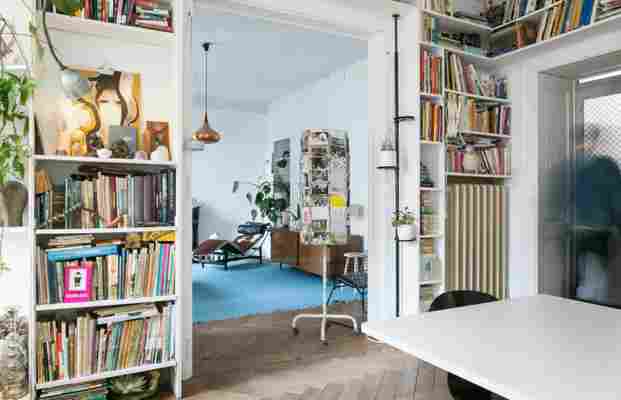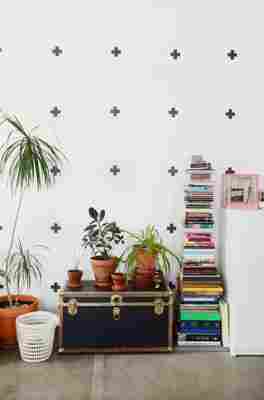This Reading Challenge Helped Me Fall Asleep Faster and Finish 75 Books in One Year

I’ve always liked reading, and can think of nothing better than getting lost in a good story. However, actually getting myself to read has always been sporadic. It felt like I rarely had time for it unless I was commuting to work, on a plane, or lying on the beach.
So when the pandemic hit last year, my reading time actually took a nosedive: I was no longer commuting or traveling, so when would I have time to crack open a book? But with a ton of newfound time on my hands, I felt like I finally had time to read more consistently . Around April last year, I decided to create a new nighttime routine. With a ton of unread books sitting in my Kindle, I set out to read an hour before bed every day getting into a bit of a routine.
What I Did:
After finishing my skincare routine , I would nestle into bed around 10 p.m. and flip through pages of everything from “The Giver of Stars” by Jojo Moyes to “Know My Name” by Chanel Miller. Aside from a few social obligations or dates, I found myself reading at this time , every single night — even on the weekends.
There were times when I was reading something heavy, or I already felt very tired and wanted nothing more than to not read that night. In the latter case, I went to bed early without guilt, otherwise I would promise myself I just needed to read one chapter to keep my commitment. More often than not, one chapter turned into another and I could read for the hour I allotted before bed. (If I really couldn’t get into a book after a few chapters, I would give myself permission to move onto something else.)
With my new nighttime routine, I read a whopping 75 books last year, which is a record I may never beat. Aside from bragging to my book friends about my accomplishment, I’ve noticed numerous benefits that have kept me reading before bed for over a year now.

I fell asleep faster.
As someone working in the news, I never felt able to “turn off” updates about the unfolding coronavirus pandemic last year. As a result, I felt like I couldn’t escape the minute-by-minute updates that were, for many people, the case of life and death — but also an overload of understandably stressful information.
As a result, these thoughts would haunt me as I tried to go to sleep. I’m not alone, either: At least one study has documented the rise in insomnia symptoms during the pandemic — and healthcare workers were more likely to experience it than peers who worked in other fields. Reading was a small habit, but I realized it helped: It was an hour when I used my brainpower to focus on whatever woman was attempting to solve a murder in the latest thriller I was reading.
According to Dr. Roy Raymann, Ph.D., a sleep scientist and the founder of Sleep Czar , this makes sense as an activity like reading can help you relax, even if you’re deep in a thriller.
“It takes a while to really wind down from being active and alert to being more relaxed and restful,” he told Apartment Therapy. “Reading a book can be an essential part of that wind-down period and might facilitate an easier start of your sleep.”
I actually slept through the night.
Aside from falling asleep sooner than I had previously, reading has also helped me to actually sleep through the night. Occasionally, but especially during the pandemic, I would find myself waking up in the middle of the night and unable to fall back to sleep — and often playing around on my phone and further disrupting my sleep.
But swapping my Netflix binge sessions before bed has helped with my sleep health. Dr. Alon Y. Avidan MD, MPH, the director of the UCLA Sleep Disorders Center, explains that he recommends that his patients avoid using electronics two hours before bedtime, as doing so may disrupt brain waves that help you fall asleep.
“Blue light before bedtime inhibits the release of melatonin from the brain,” he tells Apartment Therapy. “Melatonin, being the hormone of darkness, allows the brain to shut down and prepares us for sleep.”
While reading can help someone avoid blue light, Dr. Avidan says it may be counterproductive to read on an e-reader or tablet with bright light late at night. Some devices, like Kindles, use dull light and e-ink, while others have night mode to help limit your blue light dose. And when all else fails, there’s always a good, old-fashioned ink-and-paper book.
My writing improved.
Plenty of famous writers call themselves readers first, and with good reason: Not only are you exposing yourself to different styles of writing that you can incorporate as you read, but you’re subconsciously thinking about good sentence structure and prose. Even if you’re not planning on writing a novel any time soon, you can learn from the descriptiveness of fiction to incorporate into your own writing, whether that’s an article or even a work email.
Becoming a stronger writer is probably the biggest reason why I am encouraged to keep up my new bedtime routine. I’ve noticed I’ve been more thoughtful about my phrasing and have expanded my word choice as I read. Additionally, I’m more aware of how I can improve sentence structure and make things more clear for the person reading my own work.
I explored new genres.
Before I embarked on my new consistent reading journey, I almost exclusively read thriller books — to the point where I began to guess the killer by page 50, which made the genre less exciting.
With more time devoted to reading and, therefore, more books read, I opted to expand my taste. I read science fiction like “The Martian” by Andy Weir; young adult novels like “The Hate U Give” by Angie Thomas; horror like “Mexican Gothic” by Silvia Moreno-Garcia; romantic comedies like “Red, White & Royal Blue” by Casey McQuiston; historical fiction like “The Nightingale” by Kristin Hannah; and memoirs like “Just Mercy” by Bryan Stevenson.
I’ve learned I like to read anything and everything. Reading books of different genres broadens your perspective, which is also why I’ve tried to diversify the authors I read. Also, different moods call for different genres, so it’s important to think about how you’re feeling before diving into a new genre. For example, if you’re feeling overwhelmed it’s probably not a good idea to read any heavy historical fiction. I also like alternating between fiction and nonfiction, so my mind stays sharp and you can soak in what you’ve learned from nonfiction before diving into another one. And after taking a break, I no longer guess the endings of thrillers — most of the time, at least.
I created a routine I can stick to.
For optimal sleep help, Dr. Avidan says you need to have both sufficient sleep and regular sleep. That includes going to bed and waking up at the same time — yes, even on the weekends. Deviating too far from the routine can impact your circadian rhythm, which may throw off your ability to sleep in the long run.
Reading the hour before bed has helped me solidify my routine, to the point where I now consistently go to bed at 11 p.m. I also tend to wake up naturally around 7 a.m. (though I still set an alarm just in case).
“By consistently reading prior to sleep time, you will automatically build an association between reading and upcoming sleep,” Dr. Raymann says. “As a result over time, the reading will trigger to adapt to a more sleep permissive state more easily.”